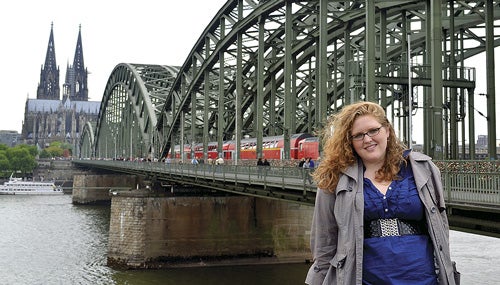Colleen Grinham ’12
Speaking the Languages
Getting clean water to impoverished or drought-stricken areas requires political will and a small army of engineers. Colleen Grinham wants to be on the front lines, finding cheaper, faster and more environmentally friendly ways to treat wastewater.
“I never thought I would end up in my niche, but I’m glad I did,” says the civil engineering graduate. “I’ve always been putting myself out there to help others.”

Grinham has visited 26 countries, including a year in Germany as part of the University’s International Engineering Program.
For six months, she studied at the Technical University of Braunschweig and conducted research at the Institute of Sanitary and Environmental Engineering. There, she found ways to design wastewater treatment plants that can simultaneously filter water and use the methane released to generate electricity.
After her time in Braunschweig, Grinham traveled 200 miles to the southwest to intern at a Bayer plant in Leverkusen. Standing shoulder-to-shoulder with German engineers, Grinham worked to improve Bayer’s wastewater treatment systems at the company’s plants around the world.
And the German engineers listened because Grinham spoke in flawless German thanks to courses she completed at URI. She complemented those lessons with Arabic classes and, crisscrossing Europe, she picked up Greek, Spanish and Italian language skills.
“Learning the language is a way to connect with people, and I’ve had the chance to apply that principle to engineering as well,” said Grinham, who served as president of the URI chapter of the Society for Women Engineers.
As a URI junior she traveled to Guatemala with a group of students to design a sustainable system of converting animal wastes into usable byproducts. The biodigester they developed turned the waste into a concentrated liquid fertilizer and produced methane for cooking.
Among the numerous awards Grinham has received was a transportation fellowship to the University of Puerto Rico, where she spent a summer training as a traffic engineer.
—Todd McLeish
 Home
Home Browse
Browse Close
Close Events
Events Maps
Maps Email
Email Brightspace
Brightspace eCampus
eCampus


